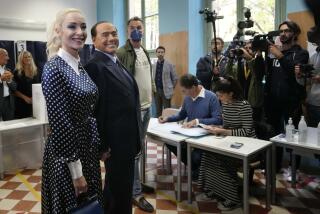In Iraq, political negotiation is a blood sport
The last seven tortuous months of bickering and bartering to form Iraq’s government? It was a garden party compared to the political endgame playing out today, in which the players are like gladiators unleashed in an amphitheater.
With the American guardians of the new democratic system fading from the scene, politicians know that this moment is pivotal. To lose now may be to lose forever.
Asked about the blood sport of Iraqi politics and the challenges of ruling the country, one politician here suggested only half-jokingly, “The only way to make an Iraqi obey you is to kill him.”
For outsiders, it may be difficult to fathom the idea of a political stalemate crippling a government for most of the year, destabilizing a fragile state and raising fears of new strife. But Iraq’s ruthless history helps explain the psychodrama behind the seemingly endless negotiations that could drag on until early next year.
“Trust is nearly nonexistent,” one party’s advisor said, commenting on the suffocating mood in Baghdad, where each group suspects the worst motives in the other.
All the players have visceral fears of what ceding power means in a country where all are scarred by the cruelty of Saddam Hussein and by the sectarian war that followed his regime’s demise.
Among the country’s long-oppressed Shiites, every political group believes it is the sect’s rightful champion, anointed to guard the Shiite majority’s newfound dominance of the country.
Fears also dominate the country’s once-powerful Sunnis, who are loath to back a Shiite-led government that may detain its leaders or jail hundreds indiscriminately, as they charge Shiite Prime Minister Nouri Maliki has done in the last two years.
Meanwhile, Iraq’s Kurds are working feverishly to guarantee their virtual independence in northern Iraq and to ensure that Baghdad will never again victimize them. But they are no longer sure who is a reliable partner amid the capital’s fractious political terrain.
At times it sounds like a farcical comedy, with dizzying combinations of paranoia.
Secular Shiite politician Iyad Allawi, whose bloc won the most seats in the spring parliamentary elections, is trusted by anti-Western cleric Muqtada Sadr’s movement, but not trusted by Maliki, who in turn isn’t really trusted by anyone. Kurdish leader and possible kingmaker Massoud Barzani trusts Allawi but not all the Sunnis on his slate.
All the Shiite factions have dark memories of their years of exile, when they competed for glory in the opposition, and watched old friends break away and rise above them. They also see the years under the Americans as a lesson in how, if given the chance, each faction will try to break the other, using the instruments of the state for patronage and action against rivals.
No one knows more about the fortunes that can be made, lost and regained than Maliki’s Dawa party.
In conversations last fall and early spring, Kamal Saadi, a senior party member, spoke of the days of humiliation when Dawa members lived in exile in neighboring Shiite-led Iran in the 1980s. He recalls how their once and future Shiite rivals, the Islamic Supreme Council of Iraq, rose up and, supported by Iran, eclipsed them.
At times, Dawa members felt hounded by their Iranian handlers, contributing to a persecution complex that endures today.
Dawa is also obsessed with another ghost from its past — Hussein’s Baath party.
A U.S. government biography of Maliki describes the prime minister as driven by the fear that Baathists are plotting their return. “He strives to be perceived as evenhanded and nonsectarian,” the biography reads, citing media reports. It continues: “U.S. diplomats, however, say … Maliki struggles to disassociate Sunnis from Baathists and Saddamists. U.S. diplomats caution he is suspicious of everyone.”
Efforts by the Americans have failed to unite Maliki with his main rival, Allawi, who has enjoyed close ties with the U.S. intelligence community. Personal rancor and vanity appear to have poisoned the relationship.
A senior Maliki supporter recounts an alleged phone call from the prime minister to Allawi in 2007 meant to repair their tense relationship; Allawi deliberately ignored the call when told Maliki was on the line, the supporter claimed.
For its part, Allawi’s slate has privately accused the Maliki government of trying to fabricate evidence of terrorism against its members. Members of Allawi’s Iraqiya group speak of men close to Maliki in the security forces as nefarious and plotting, involved in political arrests and forced confessions.
A fear of government plotting infects everyone.
Those in the ISCI, the rival Shiite group, have watched the party’s fortunes drop. Some members say they worry about their physical safety in the coming political season.
The party’s leader, Ammar Hakim, turned down a request from Iran’s supreme leader, Ayatollah Ali Khamenei, to support Maliki, so strong is the mistrust, according to ISCI members and supporters.
The ISCI is weighing a coalition with Allawi in order to prevent another term for Maliki. The arrangement could put forward ISCI member and current Vice President Adel Abdul Mehdi as a compromise candidate for prime minister.
Mehdi diagnosed the country’s troubles at a dinner during the recent holy month of Ramadan. He described a country that, whatever the promises of democracy, has not yet exorcised its demons.
“We lived under a regime where we called out, ‘father Saddam, uncle Saddam,’” Mehdi said from a giant palace that once belonged to Hussein’s family. “You cannot expect people to suddenly act normal or responsibly after Saddam.”
ned.parker@latimes.com
More to Read
Start your day right
Sign up for Essential California for news, features and recommendations from the L.A. Times and beyond in your inbox six days a week.
You may occasionally receive promotional content from the Los Angeles Times.






